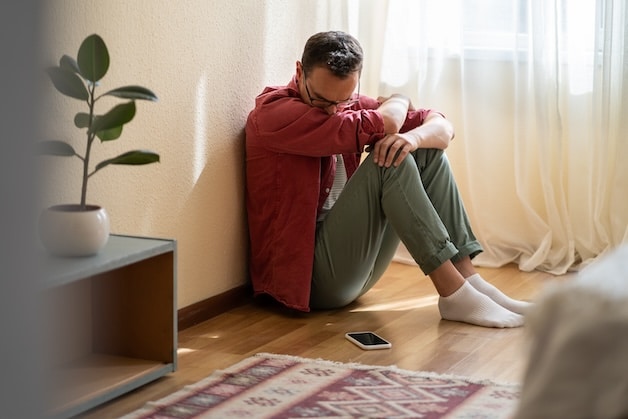A MISSION FOR MICHAEL
Overcome fear and loneliness to find the sense of belonging you’ve been searching for.

Social isolation sneaks up on you. It starts with maybe skipping a few outings or not answering calls. But then, one missed interaction turns into many, and before you know it, days or weeks have passed without meaningful contact with others.
For someone going through it, this isolation feels like a thick fog that’s hard to see through, let alone explain to someone else. You might want to reach out, but something holds you back—maybe it’s fear, maybe it’s the worry of being a burden, or maybe it’s just not knowing how to explain.
Watching someone you care about fall into this pattern can be just as tough. The person who used to share everything with you now seems miles away, even if they’re just down the street.
Whether you find social situations increasingly overwhelming, or your mood just doesn’t seem to be as “down for it” as you used to, your need for connection is still there. At AMFM, we want to help you identify and tackle whatever is standing between you and the people you love, so you can find the balance between relationships and solitude that feels right to you.
Social isolation isn’t always about being physically alone. Sometimes it’s a state of mind where even in a crowd, you feel disconnected and isolated. Here are some signs that you or someone you love might be experiencing social isolation:

If you’re noticing that you seem to be getting increasingly isolated, it’s actually your chance to stop the spiral and get help. At AMFM, we know that there are a lot of reasons someone might become disconnected, and we offer the support and strategies needed to break through this invisible barrier.
Social isolation can sneak up on anyone, and it’s often a mix of internal feelings and external situations. At AMFM, we don’t believe that a diagnosis can fully describe a person’s experience, but they can be helpful tools to describe commonly-clustered symptoms.
Here’s a look at what might cause someone to pull back from social contact:
Depression: It can sap your energy and make everything feel pointless, including socializing.
Anxiety Disorders: Anxiety symptoms and the fear of panic attacks can make social situations feel overwhelming.
Social Anxiety Disorder: This is more than just shyness. It’s an intense fear of social interactions and being negatively evaluated by others.
Post-Traumatic Stress Disorder (PTSD): Trauma can lead to feeling unsafe around others and pushing people away as a form of protection.
Obsessive-Compulsive Disorder (OCD): The compulsions and obsessions can take up so much time and mental energy, leaving little room for social interactions- or the fear of germs might keep someone from risking exposure.
Understanding these mental health causes is the first step toward addressing the root of the problem. At AMFM, we’re ready to explore these causes with you or your loved one and find ways to reconnect with the world.
Finding the right approach to tackle social isolation means understanding the individual and their unique challenges. At AMFM, we have many tools we can use to help people reconnect and find their community again. Here’s how we might do it:
| Therapy: | Whether it’s one-on-one or in a group setting, therapy can provide a safe space to explore the feelings and fears that contribute to isolation. Techniques like cognitive-behavioral therapy (CBT) can be particularly effective in addressing social anxiety and other underlying issues. |
|---|---|
| Building a Supportive Network: | Getting out of social isolation requires a supportive network. We work with clients to pinpoint potential support sources, including friends, family, and community resources, and help them tap into them. |
| Mindfulness and Relaxation Techniques: | Managing anxiety and stress through mindfulness and relaxation can make social interactions easier to handle and less overwhelming. |
| Lifestyle Changes: | Sometimes, small changes in daily routine, physical activity, or hobbies can open new doors for connection and make someone feel less lonely. |
Here at AMFM, we want to help you or your loved one overcome barriers to social connection and find the sense of belonging you’re looking for.
Understanding that overcoming social isolation involves more than just “getting out more,” AMFM uses a caring, multi-faceted strategy to address both the immediate and underlying challenges our clients face. Here’s our approach:
We dive deep into each person’s story to design support plans that resonate with their personal experiences and aspirations. Whether it’s through individual therapy to address personal fears or group sessions to practice social skills, our strategies are about opening doors to new connections.
Our environment is designed to make everyone feel welcome and understood. From casual social gatherings to structured support groups, we create spaces where people can practice interacting without pressure or judgment.
We give our clients the tools they need for meaningful social interactions. This might include workshops on communication skills, exercises in assertiveness, or strategies to navigate social anxiety.
For social isolation more than most struggles, healing happens in a community context. By involving family and friends in the process, we help build a network of understanding and support, essential for lasting reconnection.
Our chefs embrace a “nutrition as medicine” mindset, providing meals that support overall well-being and energy levels, essential for social engagement and mental health.
Recognizing the role of spiritual well-being in overall health, we offer resources and support for those who want to explore or maintain their spiritual practices as part of their recovery journey.
Our mission is to help you build strong relationships and reclaim the joy of connection, not just alleviate the symptoms of social isolation.
Call us or start the process online today. All communication is confidential.
If we are not an appropriate provider for care, we will assist in finding a care provider that can help.
Our commitment to clinical excellence is reflected in our rigorous adherence to industry standards. We hold licenses and accreditations from respected regulatory bodies, ensuring that our services meet the highest levels of quality and compliance. Listed below are the certifications that endorse our dedication to providing safe, ethical, and effective care.
Copyright 2024 © A MISSION FOR MICHAEL
All rights Reserved | Privacy Policy